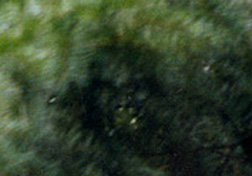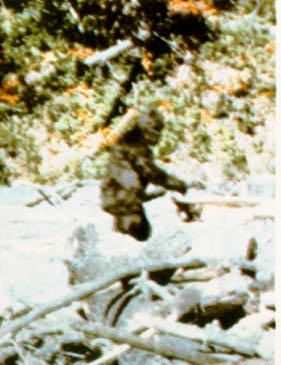
Big
Foot or YETI
 "Big Foot" is an alleged species of ape/man- like creatures, that have been seen by credible witnesses in the wilds of the North American continent, and all over the world, often leaving huge footprints, hair samples behind. Big Foot has been spotted in every state of the Union, except Delaware and Hawaii. There are organizations all over the country that keep track of various information gathered on the Big foot sightings and personal experiences with this creature. There have been so many sightings of this elusive creature, including castings of its actual footprints that the evidence of its existence is very strong. Also known as "Sasquatch" by the Indians of British Columbia, "Oh-mah-ah" by the northern California Huppa tribe, "Skunk Apes or Napes" in the southern United States, as "Seehtiks" in the Cascades, "Memegwico" by other American Indians, Yetis in Alaska/ Asia, and Almas in Russia, these creatures have been described as being between 6 and 9 feet in height, that walked gracefully, in an upright position, in smooth strides with knees bent. Weight of the creatures seen has been estimated to be between 300 to 600 lbs. They have muscular bodies, massive shoulders, and are covered with short to long hair. Their facial features are human, and the skin on their faces, hands and feet, which are distinct and human-like, are dark and leathery. Their heads, which are peaked at the back, sit right on their shoulders. In some sightings Big Foot has a jutted chin, heavy brow ridges, a receding forehead, and large, square white teeth. The female of the species has large breasts.  Family groups of these creatures and individuals as well have been sighted and described so often in the Oregon - Washington area that there are Big Foot Informational Centers in both Oregon and Washington, that keep track of all the sightings and evidence of this undiscovered species, thought by some to be a homonid that avoids human contact, keeping to themselves in their wilderness habitat, areas that have enough wildlife and vegetation to support them. Go to http://www.ratsnest.net/bigfoot/library/index2.htm to find out more about Big Foot in the United States. There are several theories as to what species Big Foot should be cataloged under, when its existence is proven without a shadow of a doubt to the scientific community. Some think that Big foot is a hominid. George Karras - http://www.ratsnest.net/sasquatch/aboutsasquatch.htm (Northwest) "One thing we know for sure is that all known apes (Pongids) have a divergent large toe while Bigfoot does not. Bigfoot's tracks indicate that its foot more closely resemble the feet of Hominids such as Homo erectus or Homo sapiens (modern man) and hair samples that can not be positively identified more closely resemble Human hair than the hair of Apes or any other known animal. It is my opinion that Bigfoot is not Human but it is closer to Human than any animal alive today." Modern day reports Sightings continue to this day. In 1970 on Mount Annapurna, Don Whillans, a British Mountaineer, heard eerie cries that his Sherpa guides told him were the screams of a 'yeti'. Don spotted a dark figure on a nearby ridge and when he examined the area the next day, he found large footprints buried 18 inches in the snow. He knew from the depths of the prints that the animal must have been extremely large and heavy and this was confirmed when he witnessed the creature pulling branches and leaves from a nearby tree. He had no doubt that what he was seeing was not a human creature or an ape since he observed the entire even for over 20 minutes through a pair of binoculars.  Two years later, on December 17, 1972, the Edward Cronin expedition (officially known as the Aruri Valley expedition) awoke to find strange tracks passing between their tents. They tracks were carefully examined and found to be 9 inches long by 4 3/4 inches wide. They were human like with 5 toes and a large heel. They attempted to follow the tracks but soon had to abandon their search when the terrain became so rough they could no longer continue. They stared helplessly as the tracks were seen to disappear over a heavily wooded ridge. It was obvious to them that whatever made the tracks was much stronger and more adept to the environment that they were. Physical evidence of yeti also exists. Tibetan monks had long claimed to possess the hand of a yeti creature. In 1959, a Westerner named Peter Byrne sought to analyze the hand. After a little persuasion, the monks agreed to let Peter examine the hand in private. Peter, apparently a not-so-honest kind of guy, stole a finger and thumb off of the hand. In it's place, he stitched a human finger and thumb that he snuck into the complex. The yeti parts were smuggled into India. From there, the famous film actor, James Stewart, and his wife Gloria, wrapped the parts in underwear and buried them deep in their suitcases. The yeti souvenirs made it across the remaining borders and into England in a suitcase. The British primatologists W.C.Osman Hill, analyzed the parts and at first declared them human. Later he changed his analysis and reported that they were probably from a Neanderthal. Zoologist Charles A. Leone and anthropologist George Agogino then took their turn in examining the ill-obtained specimens and stated that they were from a human hand with very primitive characteristics. Blood tests obtained from the skin of the finger, indicated that the parts were neither human nor primitive. Fecal droppings were also obtained during the 1959 expedition. When examined in the laboratory, they were shocked to discover an unknown parasite. They deduced that since the parasite was previously unknown, the hosts that the fecal droppings came from would therefore also be 'unknown'. Large prehistoric ape fossils were soon discovered in the Himalayan foothills giving rise to the theory that the strange creature must be some sort of unknown ape. Some speculated that the creature may have evolved from one of these prehistoric apes. What is definitely known is that something strange exists in the Himalayan mountains - an elusive creature that continues to puzzle scientists... |
More can be addded on request. Direct your requests at vinit@theunexplainedmysteries.com